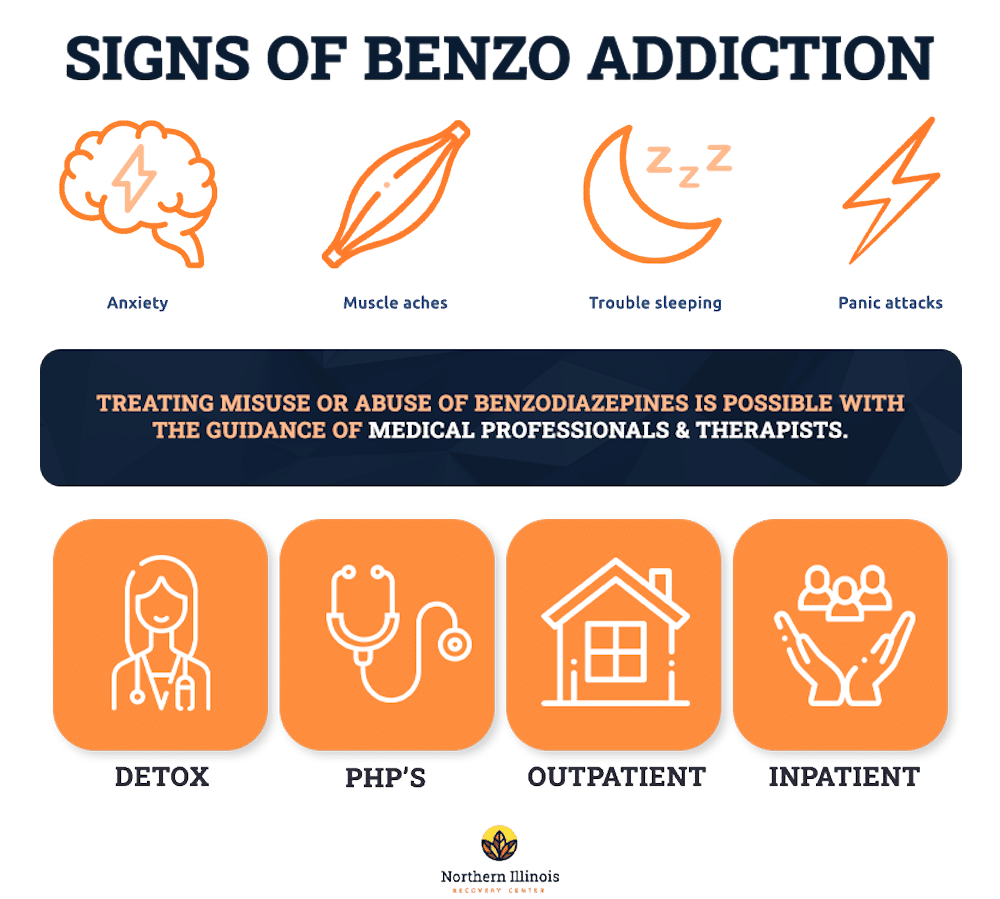Benzodiazepine Addiction Treatment in Florida
You’ve been popping those little pills for years to calm your nerves and help you sleep, but lately, you need to take more just to feel normal.
The anxiety and insomnia that first led you to benzodiazepines like Xanax, Valium, and Ativan seem to have taken a back seat to an even bigger problem – you can’t seem to stop taking them!
Benzodiazepine addiction has quietly crept up on you, and now you find yourself caught in a dangerous cycle of increasing tolerance, dependence, and withdrawal. The good news is that there are benzodiazepine addiction treatment options in Florida that can help you break free from your benzo addiction and start healing.
Benzodiazepines are prescribed for several medical purposes, including the following:
Anxiety Disorders
- Insomnia
- Seizure Disorders
- Muscle Relaxation
- Alcohol Withdrawal

Types Of Benzodiazepines
- Alprazolam (Xanax)
- Diazepam (Valium)
- Lorazepam (Ativan
- Clonazepam (Klonopin)
- Chlordiazepoxide (Librium)
While benzodiazepines can be effective for short-term relief of certain conditions, they are associated with risks, including the potential for dependence and addiction. Prolonged use or misuse can lead to tolerance, withdrawal symptoms, and, in some cases, substance use disorders. Therefore, it’s crucial to use benzodiazepines under the guidance of a healthcare professional, and any concerns about their use should be discussed with a doctor. Abrupt discontinuation of benzodiazepines can lead to withdrawal symptoms and should be managed with medical supervision.
How Do Benzos Work and Why Are They Addictive?
Benzodiazepines work by slowing activity in the brain and central nervous system. They bind to special receptors that help regulate anxiety, stress, and fear. When you take a benzo like Xanax or Valium, it causes feelings of calmness and relaxation.
The problem is that your body adapts to the effects over time and you need higher doses to get the same high. Benzos also disrupt your brain’s natural ability to manage anxiety and stress on its own. This is the factor that makes them highly addictive.
If you’ve been regularly using benzodiazepines, your body has developed a dependence on them. When you decide to stop, withdrawal symptoms occur as your body readjusts to functioning without these substances. Fortunately, there are several treatments and options available to help you overcome benzodiazepine addiction. While the journey ahead may not be without its challenges, the promise of freedom from addiction and the opportunity for a more fulfilling life make each step along the way worthwhile. Remember, you have the strength to navigate this path, and with the right support, you can achieve success in overcoming benzodiazepine dependence. You’ve got this!
What Are the Signs and Symptoms of Benzodiazepine Abuse?

Benzodiazepine misuse can be indicated by a range of physical and psychological symptoms. The effects of benzos can vary from person to person, and what starts as mild symptoms can quickly escalate to life-threatening conditions. Common symptoms of benzodiazepine misuse include:
- Weakness in muscles
- Slurred speech
- Confusion
- Impaired judgment
- Blurred vision
- Reduced motor skills
- Dizziness
- Coma
- Breathing difficulties
- Risk of overdose or death
- Memory issues
- Headaches
- Anxiety
- Tremors
- Insomnia
- Loss of appetite
When a person reduces or stops their benzodiazepine intake, the brain undergoes withdrawal symptoms, potentially leading to uncontrollable seizures. This highlights the danger of withdrawing from benzodiazepines without medical supervision. It is highly advisable to seek a medical detox program for safe withdrawal.
Benzodiazepine abuse can manifest through various signs and symptoms, indicating a problematic pattern of use. Recognizing these signs is crucial for prompt intervention and support. Common indicators of benzodiazepine abuse include:
- Increased Tolerance: Over time, individuals may find that they need higher doses of benzodiazepines to achieve the desired effects, indicating the development of tolerance.
- Physical Dependence: Regular use can lead to physical dependence, where the body adapts to the presence of the drug, and sudden cessation results in withdrawal symptoms.
- Doctor Shopping: Individuals may engage in “doctor shopping” to obtain multiple prescriptions from different healthcare providers, a red flag for potential substance misuse.
- Social Withdrawal: Benzodiazepine abuse can lead to social withdrawal and isolation as individuals prioritize drug use over social interactions.
- Changes in Behavior: Shifts in behavior, such as increased impulsivity or risk-taking, may be observed in those abusing benzodiazepines.
- Memory Impairment: Benzodiazepines can impact cognitive function, leading to memory impairment and difficulty concentrating.
- Neglect of Responsibilities: Individuals may neglect work, school, or familial responsibilities, focusing instead on obtaining and using benzodiazepines
- Financial Issues: The cost of obtaining benzodiazepines illicitly or through excessive prescriptions can lead to financial strain.
- Mood Swings: Unexplained mood swings, ranging from extreme euphoria to irritability, may be indicative of benzodiazepine abuse.
- Craving: Strong cravings for benzodiazepines, coupled with an inability to cut down on or control use, are classic signs of substance abuse.
- Physical Symptoms: Physical signs may include drowsiness, dizziness, slurred speech, and impaired coordination.
- Engaging in Risky Behaviors: Benzodiazepine abuse can lead to engaging in risky behaviors, such as driving under the influence or combining substances.
Recognition of these signs and symptoms is essential for early intervention and seeking professional help.
Recognizing the signs and symptoms of benzodiazepine misuse and overdose is crucial. Benzodiazepine overdose is a life-threatening emergency that requires immediate medical attention. While it is ideal for individuals to be forthcoming about their benzodiazepine use in case of an overdose, this is not always the case. Therefore, prompt emergency assistance is vital at the first sign of an overdose.
If you or someone you know is exhibiting these indicators of benzodiazepine abuse, reaching out to a healthcare professional or addiction specialist is crucial for appropriate assessment and guidance toward recovery.
Behavioral Indications of Benzodiazepine Misuse
Individuals may not realize that sedative use disorder is slowly developing. But when it develops, it can be impossible to hide. When a person is abusing benzodiazepines, they start to exhibit uncharacteristic behaviors. According to the Mayo Clinic, a person abusing benzodiazepines will exhibit specific actions, including the following.
- Individuals will isolate and withdraw from friends and family.
- People will hoard benzos for fear of running out.
- People will do anything for benzodiazepines such as borrowing money, stealing, and maxing out credit cards.
- People will engage in risky behaviors to achieve drugs and when they are high. These behaviors can include driving while high, entering dangerous areas to buy benzos, and even prostituting themselves for drugs and money.
- A decrease in personal hygiene can happen in a person fighting benzodiazepine abuse.
- A person on benzos will become highly secretive and also lie about what they are doing.
- People who once were happy-go-lucky and loved being around friends and family are now irritable, rude, and have a new set of friends.
People who abuse benzodiazepines usually swallow pills. Crushing benzos does not seem to have a different effect, and benzos are not injectable, so there isn’t paraphernalia lying around. For this reason, it is easier to abuse benzos around other people and not be noticed.
“Doctor shopping” is prevalent in people who abuse benzodiazepines. Individuals will visit a few different doctors and get a prescription for a benzodiazepine. Then they visit a few different pharmacies to get them filled. A sign of “doctor shopping” is when a person has multiple bottles of the same drug from different doctors and pharmacies.
The Dangers of Benzodiazepine Abuse and Addiction
The withdrawal symptoms associated with benzodiazepines can pose significant risks, potentially becoming life-threatening. As your body becomes dependent on the drugs, stopping use abruptly can lead to seizures, psychosis, and other medical issues. The safest way to stop benzos is under medical supervision through a slow taper.
Overdoses are also possible, especially if benzos are mixed with other substances like opioids or alcohol. An overdose can slow your breathing and heart rate to dangerous levels and may lead to a coma or even death.
Prolonged abuse of benzodiazepines significantly impacts both your physical and mental well-being. Problems with memory, cognition, and coordination are common. Anxiety, depression, and insomnia are often made worse over time. Benzo abuse is also linked to dementia and Alzheimer’s disease later in life.
The addictive nature of these drugs means that abuse and dependence tend to worsen gradually over time. Tolerance builds up, requiring higher and higher doses to achieve the desired effect. This cycle of increasing dosage and worsening side effects can continue indefinitely without proper treatment.
Often, the only way to overcome benzodiazepine addiction and stay away from the many risks associated with these potent medicines is to seek assistance from a medical detox and treatment program. Recovery is feasible and treatment is effective!
What Treatment Options Are Available for Benzodiazepine Addiction?
The first step in overcoming a benzo addiction is undergoing the detox process in the care of doctors and nurses. They will slowly taper your dosage down to minimize withdrawal symptoms. Medications and IV fluids are used to keep you comfortable, and medical staff monitor vital signs around the clock. Detox can take weeks or months, depending on factors like:
- The specific benzo(s) used and dosage/frequency
- Length of addiction
- Individual physiology
Withdrawing from benzos may cause seizures, hallucinations, and other medical issues, so detoxing at a licensed center is critical.
Following detox, therapy helps you understand the underlying causes of your addiction and gives you strategies to avoid relapse. Options include:
- Individual therapy: Meet one-on-one with a therapist to address trauma, mental health issues, relationships, etc.
- Group counseling: Share experiences and support each other in a group setting.
- Family therapy: Involve close ones in your recovery and healing process.
- Cognitive behavioral therapy (CBT): learn coping skills and change harmful thought/behavior patterns.
Overcoming benzodiazepine addiction is a lifelong effort. Continue with outpatient treatment, join a support group, adopt healthy lifestyle changes, and avoid triggers. Stay committed to your sobriety and make the most of the treatment and resources available in Florida. You can beat this.
Discover Transformative Recovery with Ambrosia’s Benzodiazepine Addiction Treatment Center

Dr. Alam is an internationally renowned psychiatrist with academic affiliations with Northwestern University and University of Illinois, Chicago where he completed his residency training. He has been a principal investigator for over forty studies and has been involved in research leading to the approval of most psychiatric medications currently on the market. He is the founder of the Neuroscience Research Institute which continues to conduct research on cutting edge medication and interventional psychiatry. Dr. Alam is a Distinguished Fellow of the American Psychiatric Association and the American Society of Addiction Medicine. He has won several awards and has been featured extensively on radio and television.





